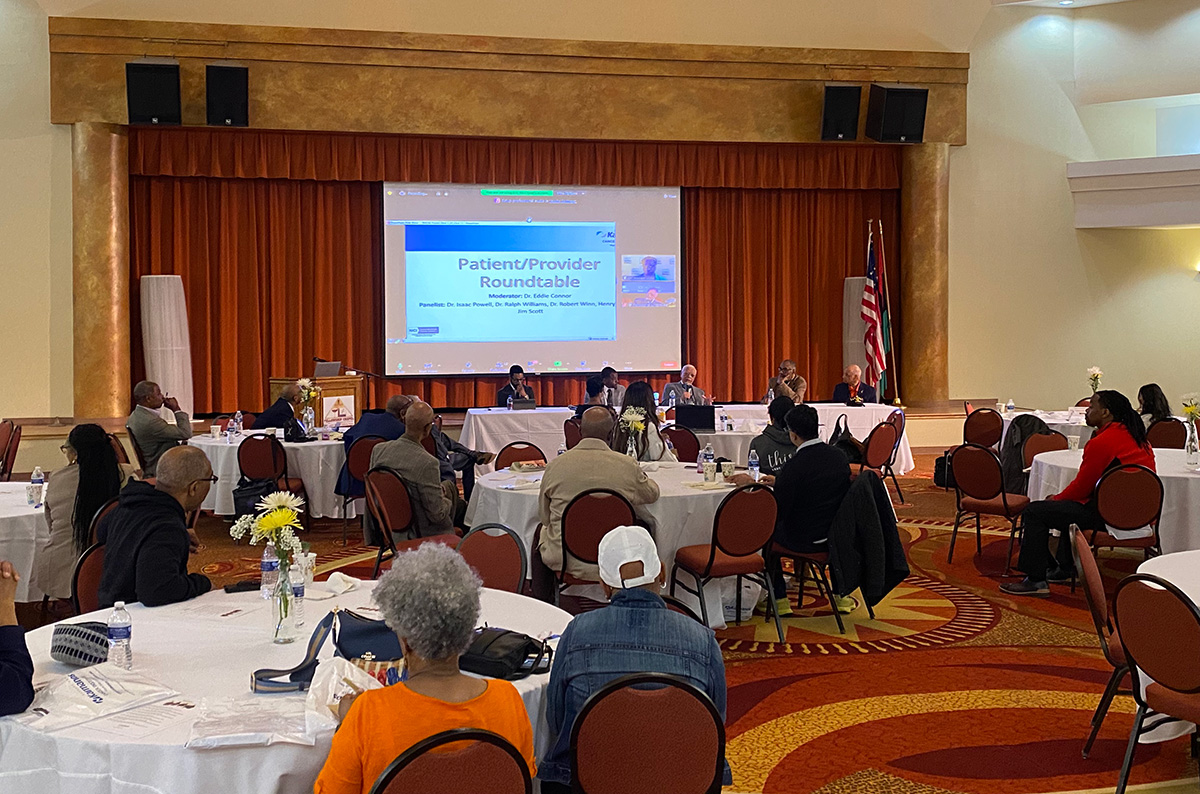
Hailed by attendees as a ground-breaking, courageous endeavor to better understand and improve disparities in cancer care, the Black Men’s Cancer Action Council (CAC) of Karmanos Cancer Institute’s Office of Cancer Health Equity and Community Engagement (OCHECE) hosted an in-depth and spirited symposium on May 20 at Detroit’s Fellowship Chapel. Local, state and nationally-acclaimed cancer experts and survivors tackled problems traditionally plaguing Black men who question the trustworthiness of medical institutions, leading to avoidance of pivotal cancer screenings and care.
The symposium started with a welcome from moderator Hayley Thompson, Ph.D., associate center director of Community Outreach and Engagement, member of the Population Studies and Disparities Research Program at Karmanos and professor in the Department of Oncology at Wayne State University (WSU) , assisted by Voncile Brown-Miller, the OCHECE manager of Community Engagement.
Robert Thomas and Jim Scott, members of the Black Men’s CAC, served as the event emcees. Scott shared his experience as a long-suffering bladder cancer patient and military veteran. He now has dedicated his time to repeated testimony before congressional committees in Washington, DC. He stresses the pertinent need for patient respect.
“If they aren’t receiving that, they should change doctors,” he said. “Also, if you don’t know something, ask.”
Thomas’ family history with cancer drew him to the CAC, where solving community medical issues through concept maps and research questions greatly intrigued him.
Two national luminaries with extensive field work spoke next: Andrew Anderson, Ph.D., assistant professor in the Department of Health Policy and Management at Tulane University, and Sirry Alang, Ph.D., associate professor in the Department of Health and Human Development at the University of Pittsburgh. Dr. Anderson explained that trust is first a behavior that evolves into an attitude formed by beliefs based on experience, and even persuasion. He has done extensive research surrounding Black veterans with prostate cancer.
“Black men have higher levels of mistrust that evolves over time due to multiple negative medical interactions,” Dr. Anderson explained. “It’s important to give patients more information and more power in their care through intervention. Focus has been on changing the patient, but really it needs to be on the entire system.”
Dr. Alang added that Black men’s pervasive suspicions are rooted in the historical community legacy of racism, discrimination and negative experiences. She also stated that prejudices also occur through the presence of law enforcement and security in hospitals, nursing homes and other institutions. Mistrust, she said, needs “unlearning.”
“Bringing life experiences into medical institutions shows that the whole system is intertwined. And we all play a role in that,” she added.
Implicit bias in healthcare providers was a theme helmed by Lauren Hamel, Ph.D., co-leader of the Population Studies and Disparities Research Program at KCI and associate professor in the WSU Department of Oncology. Improvements being overseen in requirements for medical workers were addressed by Rhonda Dailey, M.D., assistant professor in the WSU Department of Family Medicine and Public Health Services and director of the Office of Community Engaged Research, along with Marlon Brown, D.P.A, chief administrative officer of Michigan’s Department of Licensing and Regulatory Affairs.
“Prejudice can be defined as an unconscious bias toward certain groups based upon their ethnicity,” said Dr. Dailey. “These are micro-aggressions, but exposing that bias is key in order to be an agent of change.”
Dr. Brown reiterated the disproportionate damages created in communities of color with the recent pandemic, including statistics of the higher number of Black deaths. The ensuing establishment of the Coronavirus Task Force by Governor Gretchen Whitmer has improved local health department practices and developed follow-up procedures to counter implicit bias.
“It’s making an impact,” added Dr. Dailey.
The final portion of the program included an informative roundtable exchange among survivors and physicians and was moderated by survivor Eddie Connor, Ed.D., founder of Eagles Academy, Boys 2 Books and Gifted for Greatness. Medical data and panel input highlighting personal experiences followed from Jim Scott and Henry McKee, both cancer survivors and Black Men’s CAC members; Isaac Powell, M.D., urologic oncologist and member of the Genitourinary Oncology Multidisciplinary Team at Karmanos, as well as professor at WSU’s Department of Urology; , Ralph Williams II, M.D., assistant professor at WSU’s Department of Family Medicine and Public Health Sciences; and Robert Winn, M.D., director and Lipman Chair in Oncology at Virginia Commonwealth University Massey Cancer Center.
Their conversation revealed that successful doctor-patient relationships result from high-level communication and patient autonomy, where each patient is treated as an individual and reviewing each case is done eye-to-eye. Consistency in treatment also earns overall neighborhood trust and women play a key role by urging males to screen and treat cancers. Participants also agreed that establishing an understanding of equality has to begin early in life, at least in kindergarten.
A breakout session followed with full-group suggestions for greater trust. Eric McCloud, Black Men’s CAC facilitator, wrapped up the symposium by urging participants to talk to their communities and actively seek resolutions related to medical mistrust and cancer care.
To learn more about OCHECE and other upcoming discussions and events, click here.
This article was written by Wendy Clem, member of the Macomb County Cancer Action Council.